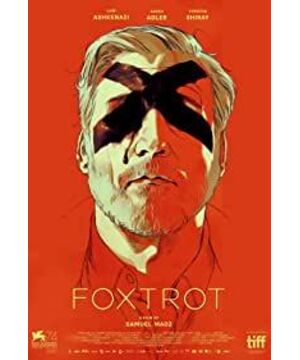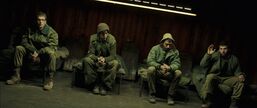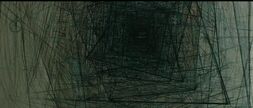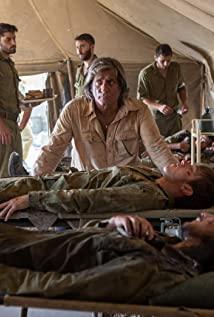In 2009, the Israeli director Samuel Maoz, who won the Golden Lion Award for his feature film "Lebanon", finally made his second film "Foxtrot". It applies the classic ancient Greek tragedy framework, and creates a karma story full of emotion and heart-wrenching fate through the three-part story of father and son.
The film opens with a dramatic home interior scene. Wife Dafna answered the bell to open the door, but outside stood the solemn soldier he never wanted to see in his life, "Are you Johann's mother?" Undoubtedly, this could only be the messenger of death that brought bad news. The mother fainted on the spot, and the father Michael, who was in the depths of the living room, appeared with a subtle change of expression that made the audience feel subconscious, perfectly performing the physical reaction that a tough father who heard the bad news should have made -- his inner emotions collapsed, and the surface was broken. Have to be strong again.
This is a very embarrassing and embarrassing situation for both the sender and the recipient. The director used a very capable shooting technique to present all the programmed condolences from the military after the death of the soldiers on this large room stage, as well as the simple and crude funeral process that not only comforts the feelings of the martyrs' families but also strictly enforces military regulations. Especially in Israel, a country with the dual characteristics of a military policy and complicated religious ceremonies, through the military to unilaterally inform the father Michael of the process, the director is also very efficient to let the audience know about the Jewish law and the military. The system is coerced.
The mood of watching the movie was further led to an embarrassing situation. When will the family, especially the father Michael who is responsible for the aftermath, get out of the lowest emotional trough and carry the coffin covered with the Jewish hexagram flag? Will this family's relationship, which we don't know yet, collapse in the following movie time, such as how the closed and oppressive environment presented by another excellent Israeli film "Seven Days of Mourning" makes the family turn against each other. scar. The supporting characters, Michael's younger brother, who earnestly helped get through the difficulties, his daughter who only existed as an expression of "this family is not over", and a grandma who is a strange and mysterious image, all appeared one after another, which seemed to lead the story to disintegration. the road of destruction.
However, Samuel Maoz clearly has bigger philosophical ambitions than telling great stories. There is a scene in the living room where the uncle turns around, and on the laptop screen on the table is the mourning ritual flow from the military, next to a bowl of oranges. From the director's point of view, this picture is the national symbol of Israel that contains both special products and war situations - oranges and the dead. Of course, in the story of the movie, the barracks foxtrot dance in another time and space replaced the orange, becoming the dance of destiny that has to return to the original point.
The second story of the border post is surreal. The simple barracks is tilting and collapsing. From the barracks to the highway outpost, you have to step through the deep mud. There is a container with searchlights beside the highway. Highlight with the passengers and become the protagonist in the crisis-ridden inspection scene. Machine guns can guarantee suppressive firepower in emergencies, but they can also get out of control and lead to tragedy.
The uncontrollable events of the city apartment and the border guard post, as well as an unfinished sexual fantasy cartoon that links the father and son relationship, portrays the son and the father on their feet and portrays them as tragic heroes in Greek dramas who have to pay for their mistakes. And he is a hero who can never get rid of his own destiny in a closed loop. The delicate weaving of the story and the ambiguity of the allegory of fate, in this film, can form a kind of tacit understanding that does not contradict each other, like the foxtrot dance that is more and more familiar.
Samuel Maoz knew he was favored by fate. When his eldest daughter was in high school, she used to be very bedridden. When she couldn't catch the bus, she had to spend her father's money to take a taxi to school at a high cost. Samuel didn't want to indulge his daughter anymore, and ordered her to get up early and take the No. 5 bus to school like other classmates. One morning, half an hour after his daughter left the house, he saw on TV the news that terrorists blew themselves up on the No. 5 bus. He anxiously dialed his daughter's mobile phone, but the cellular mobile network collapsed due to the sudden increase in data volume. Another half an hour later, her daughter appeared at the door. She was late again and missed the bombed No. 5 bus.
The director and his daughter have never done anything terribly wrong, so there is no need to be superstitious and worry about the retribution that will come sooner or later. But Michael, the soldier in the movie, isn't he a happy big boy before he makes a big mistake? He imagined the cosmic goddess of his father's erotic fantasy comics with a huge chest and black bars, holding a submachine gun tightly, dancing a foxtrot to the bright Latin music, one step left, one step back, one step right, one step forward .
View more about Foxtrot reviews











